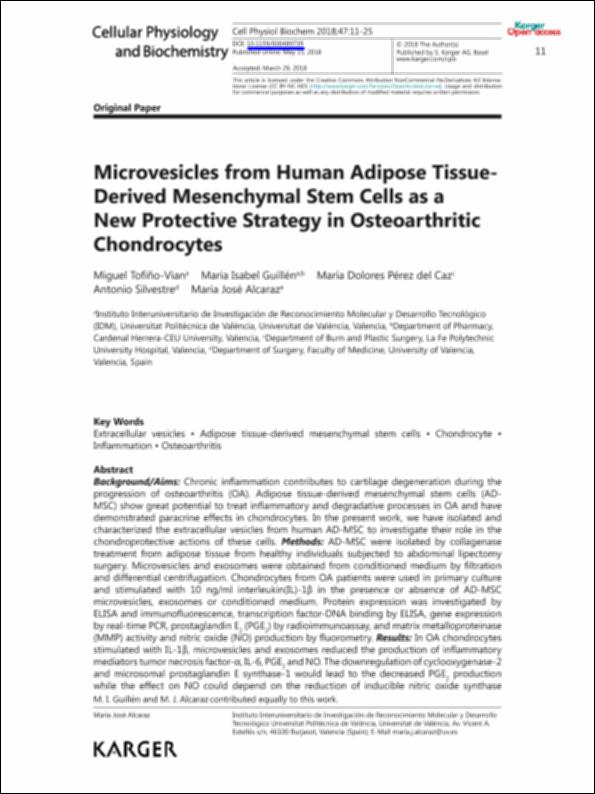Por favor, use este identificador para citar o enlazar este ítem:
http://hdl.handle.net/10637/9983Microvesicles from human adipose tissue-derived mesenchymal stem cells as a new protective strategy in osteoarthritic chondrocytes
| Título : | Microvesicles from human adipose tissue-derived mesenchymal stem cells as a new protective strategy in osteoarthritic chondrocytes |
| Autor : | Tofiño Vian, Miguel Guillén Salazar, María Isabel Pérez del Caz, María Dolores Silvestre Muñoz, Antonio Alcaraz Tormo, María José |
| Materias: | Articulaciones - Enfermedades - Tratamiento.; Células madre - Uso terapéutico.; Osteoarthritis - Treatment.; Joints - Diseases - Treatment.; Osteoartritis - Tratamiento.; Cartilage - Diseases - Treatment.; Joints - Inflammation - Treatment.; Cartílagos - Enfermedades - Tratamiento.; Stem cells - Therapeutic use.; Articulaciones - Inflamación - Tratamiento. |
| Editorial : | S. Karger AG |
| Citación : | Tofiño Vian, M., Guillén, MI., Pérez del Caz, MD., Silvestre, A. and Alcaraz, MJ. (2018). Microvesicles from human adipose tissue-derived mesenchymal stem cells as a new protective strategy in osteoarthritic chondrocytes. Cellular Physiology and Biochemistry, vol. 47, n. 1, pp. 11-25. |
| Resumen : | Background/Aims: Chronic inflammation contributes to cartilage degeneration during the progression of osteoarthritis (OA). Adipose tissue-derived mesenchymal stem cells (ADMSC) show great potential to treat inflammatory and degradative processes in OA and have demonstrated paracrine effects in chondrocytes. In the present work, we have isolated and characterized the extracellular vesicles from human AD-MSC to investigate their role in the chondroprotective actions of these cells. Methods: AD-MSC were isolated by collagenase treatment from adipose tissue from healthy individuals subjected to abdominal lipectomy surgery. Microvesicles and exosomes were obtained from conditioned medium by filtration and differential centrifugation. Chondrocytes from OA patients were used in primary culture and stimulated with 10 ng/ml interleukin(IL)-1β in the presence or absence of AD-MSC microvesicles, exosomes or conditioned medium. Protein expression was investigated by ELISA and immunofluorescence, transcription factor-DNA binding by ELISA, gene expression by real-time PCR, prostaglandin E2 (PGE2) by radioimmunoassay, and matrix metalloproteinase (MMP) activity and nitric oxide (NO) production by fluorometry. Results: In OA chondrocytes stimulated with IL-1β, microvesicles and exosomes reduced the production of inflammatory mediators tumor necrosis factor-α, IL-6, PGE2 and NO. The downregulation of cyclooxygenase-2 and microsomal prostaglandin E synthase-1 would lead to the decreased PGE2 production while the effect on NO could depend on the reduction of inducible nitric oxide synthase expression. Treatment of OA chondrocytes with extracellular vesicles also decreased the release of MMP activity and MMP-13 expression whereas the production of the anti-inflammatory cytokine IL-10 and the expression of collagen II were significantly enhanced. The reduction of inflammatory and catabolic mediators could be the consequence of a lower activation of nuclear factor-κB and activator protein-1. The upregulation of annexin A1 specially in MV may contribute to the anti-inflammatory and chondroprotective effects of AD-MSC. Conclusions: Our data support the interest of AD-MSC extracellular vesicles to develop new therapeutic approaches in joint conditions. |
| Descripción : | Este artículo se encuentra disponible en la página web de la revista en la siguiente URL: https://www.karger.com/Article/FullText/489739 |
| URI : | http://hdl.handle.net/10637/9983 |
| Derechos: | http://creativecommons.org/licenses/by-nc-nd/4.0/deed.es |
| ISSN : | 1015-8987. 1421-9778. |
| Fecha de publicación : | 9-feb-2018 |
| Centro : | Universidad Cardenal Herrera-CEU |
| Aparece en las colecciones: | Dpto. Farmacia |
Los ítems de DSpace están protegidos por copyright, con todos los derechos reservados, a menos que se indique lo contrario.


